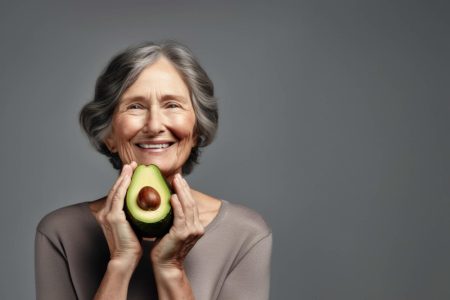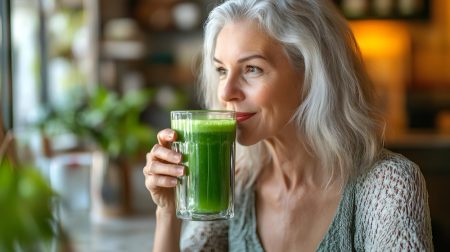Introduction
In our quest for radiant, youthful-looking skin, we often turn to skincare products, serums, and beauty treatments. While these can certainly contribute to a glowing complexion, the true foundation of skin health lies deeper—beginning with the nutrients we consume every day. Nourishing our skin from within is a powerful way to support a smooth, supple texture and combat common signs of aging. By choosing the best foods for the skin, you can harness the benefits of essential vitamins, minerals, and antioxidants that work together to promote hydration, elasticity, and resilience against environmental stressors.
The best foods for the skin are those rich in skin-supportive nutrients like Vitamin C, Vitamin E, Omega-3 fatty acids, and antioxidants. These nutrients help fight oxidative stress, which can lead to premature aging, and they support collagen production, which keeps skin firm and youthful. Eating a balanced, nutrient-rich diet can naturally reduce inflammation, boost moisture retention, and protect your skin against harmful UV rays.
Incorporating these foods doesn’t require a complete dietary overhaul. It’s about simple, mindful choices that make a big difference over time. Think of avocados, berries, nuts, and leafy greens as skin-loving allies that are easy to integrate into daily meals. In this post, we’ll explore the top foods that offer these skin-enhancing benefits and give you practical ways to add them to your diet. With a little guidance, you can create a routine that’s as beneficial for your skin as it is delicious.
Affiliate Disclaimer
This blog post may include links to affiliate sites. If you click on an affiliate link and make a purchase, we may earn a small commission or receive other compensation at no extra cost to you. Please note that many of the links on our site are affiliate links. Our use of these links does not impact the products, services, or websites we recommend to you. This disclaimer covers all forms of communication with you, including our website, email, phone, social media, products, and other platforms.
Amazon Affiliate Disclaimer
We participate in the Amazon Services LLC Associates Program, an affiliate marketing program that allows us to earn fees by linking to Amazon.com and its affiliated sites. If you click on an Amazon affiliate link on our site and make a purchase, we may receive a small commission at no additional cost to you.
The Role of Nutrition in Skin Health
Our skin is the largest organ of the body and often the first to show signs of nutrient deficiencies or oxidative damage. What we eat directly influences our skin's appearance and resilience, making diet a cornerstone of skincare. While topical products treat the surface, the best foods for the skin work internally, addressing skin health at the cellular level. Nutrients from these foods act as building blocks for skin cells, fortify the skin's natural barrier, and protect against environmental stressors like UV exposure and pollution.
1. Antioxidants: Your Skin’s Protective Shield
Antioxidants are among the best foods for the skin because they neutralize free radicals, which are unstable molecules that cause cellular damage and accelerate aging. Foods rich in antioxidants, such as berries, nuts, and dark leafy greens, help combat oxidative stress, a major contributor to fine lines, wrinkles, and skin dullness. Vitamins C and E are powerful antioxidants that shield skin cells from damage and support healing. Vitamin C, for instance, plays a key role in collagen synthesis, which is vital for maintaining skin firmness and elasticity.

2. Omega-3 Fatty Acids: Essential for Skin Hydration
Omega-3 fatty acids, primarily found in fatty fish, flaxseeds, and walnuts, are beneficial fats that keep cell membranes healthy, enabling skin cells to retain moisture. This is especially important for dry or mature skin, as hydration helps reduce the appearance of fine lines and promotes a dewy glow. Omega-3s also have anti-inflammatory properties, which can reduce redness and irritation, making these foods ideal for people with sensitive or acne-prone skin.
3. Collagen-Supporting Nutrients: Firmness and Elasticity
Collagen, a structural protein in the skin, provides firmness and prevents sagging. As we age, collagen production slows, leading to thinner skin and fine lines. Certain nutrients, such as Vitamin C and zinc, support collagen synthesis, while amino acids found in protein-rich foods (like chicken, eggs, and beans) provide the building blocks for collagen formation. Including these nutrients through the best foods for the skin helps maintain a firm, youthful appearance.
4. Hydrating Nutrients: Water for a Plump Complexion
Water-rich foods, like cucumbers and watermelons, and hydrating vitamins, such as Vitamin A from leafy greens, contribute to a hydrated, plump complexion. Hydration helps skin maintain elasticity and creates a natural glow. Staying well-hydrated from the inside out is key to reducing dullness and supporting overall skin health.
Incorporating these nutrient-dense choices creates a balanced, skin-supportive diet that promotes a healthier, glowing complexion from within.
Key Nutrients for Glowing Skin
Achieving radiant, youthful skin isn’t just about what you apply topically; it’s equally about what you eat. Certain nutrients in food play essential roles in skin health, protecting it from environmental damage, supporting collagen production, and keeping it hydrated and supple. Incorporating the best foods for the skin into your daily diet can be transformative, helping to reduce signs of aging, promote elasticity, and enhance your natural glow.
1. Vitamin C: The Collagen Booster
Vitamin C is a standout nutrient for skin, essential for collagen synthesis—the protein responsible for skin’s firmness and elasticity. Collagen gives structure to the skin, keeping it smooth and resilient. As we age, collagen production declines, which is why foods high in Vitamin C are some of the best foods for the skin. This powerful antioxidant also protects against sun damage and reduces pigmentation, brightening the skin. Excellent sources of Vitamin C include citrus fruits like oranges and lemons, as well as strawberries, bell peppers, and leafy greens. Regularly incorporating these into your diet can help maintain a firmer, more youthful appearance.

2. Vitamin E: The Skin Protector
Vitamin E is another potent antioxidant that shields the skin from oxidative stress, which is caused by free radicals from pollution, UV rays, and other environmental factors. Oxidative stress can lead to premature aging, fine lines, and dullness. As one of the best foods for the skin, Vitamin E-rich foods like almonds, sunflower seeds, and avocados work to repair skin tissue and maintain moisture. This nutrient also supports skin healing, making it particularly beneficial for those with dry or damaged skin. Adding nuts, seeds, and avocado to your meals is a simple way to provide your skin with these protective benefits.
3. Omega-3 Fatty Acids: Hydration and Inflammation Control
Omega-3 fatty acids are essential fats that the body cannot produce on its own, making it crucial to obtain them from food. These healthy fats are particularly beneficial for skin hydration and reducing inflammation. Omega-3s help to keep cell membranes strong, allowing skin cells to retain moisture, which is critical for keeping skin plump and soft. They are found in fatty fish like salmon and mackerel, as well as flaxseeds, chia seeds, and walnuts. Including omega-3-rich foods in your diet can benefit anyone, but they are especially helpful for people with dry or sensitive skin, as they reduce redness and help manage inflammatory conditions like eczema.
4. Zinc: For Healing and Anti-Inflammation
Zinc is a mineral that supports skin healing, reduces inflammation, and helps balance oil production, which can prevent acne breakouts. Zinc also plays a role in collagen formation, making it beneficial for skin firmness and structure. Foods high in zinc, such as pumpkin seeds, chickpeas, and lentils, can help manage inflammatory skin issues and promote a clear complexion. Including zinc-rich foods as part of the best foods for the skin can make a difference, particularly for those struggling with acne or inflammation.
5. Beta-Carotene (Vitamin A Precursor): Natural Sun Protection
Beta-carotene is a precursor to Vitamin A, which helps protect the skin from sun damage and promotes healthy skin cell turnover. This nutrient, found in orange and yellow vegetables like carrots, sweet potatoes, and squash, acts as a natural barrier against sunburn and contributes to a more even skin tone. Consuming beta-carotene-rich foods can add a subtle, healthy glow to the skin, enhancing radiance and overall health.
Incorporating these key nutrients regularly can help build a foundation for vibrant, youthful skin. The best foods for the skin are packed with these powerful nutrients, working from within to protect, repair, and rejuvenate the skin, so it looks its best every day.
Best Foods for a Youthful Glow
When it comes to vibrant, glowing skin, a nutrient-rich diet is your best ally. Choosing foods that support hydration, provide antioxidants, and promote collagen production is key to maintaining a youthful complexion. Let’s explore some of the best foods for the skin that you can easily incorporate into your daily routine to support a radiant, age-defying glow.
1. Berries: Antioxidant Powerhouses
Berries like blueberries, strawberries, and raspberries are packed with antioxidants, making them some of the best foods for the skin. High in Vitamin C and polyphenols, these fruits help protect skin cells from oxidative stress caused by environmental factors like UV exposure and pollution. Vitamin C in berries also supports collagen production, which is vital for keeping skin firm and preventing wrinkles. Including a handful of berries in your breakfast or snack can help brighten your complexion and fight early signs of aging.
2. Avocados: Rich in Healthy Fats and Vitamin E
Avocados are famous for their high content of healthy monounsaturated fats and Vitamin E, both of which contribute to hydrated, soft skin. These fats keep cell membranes intact, allowing skin cells to retain moisture, which results in a plump, youthful appearance. Vitamin E, an antioxidant in avocados, protects the skin from free radical damage and reduces inflammation. Adding avocado to salads, sandwiches, or smoothies is an easy way to enjoy one of the best foods for the skin.

3. Fatty Fish: Omega-3 Rich for Hydration and Elasticity
Fatty fish, such as salmon, sardines, and mackerel, are excellent sources of Omega-3 fatty acids. These healthy fats are essential for keeping skin hydrated, reducing inflammation, and supporting elasticity. Omega-3s are particularly beneficial for those with dry or sensitive skin, as they reduce redness and maintain moisture levels. Regularly eating fatty fish promotes a smooth, dewy complexion and helps prevent the formation of fine lines. If you don’t eat fish, consider flaxseeds or chia seeds as plant-based alternatives.
4. Nuts and Seeds: Skin-Healing and Anti-Aging Benefits
Nuts and seeds, particularly almonds, walnuts, and sunflower seeds, provide a powerful combination of Vitamin E, healthy fats, and zinc. These nutrients work together to protect and repair skin, reducing the appearance of fine lines and enhancing skin’s elasticity. Zinc, especially, supports skin healing and can reduce inflammation, making these foods beneficial for those with acne-prone skin. Snacking on a handful of nuts or adding seeds to oatmeal or yogurt bowls is an easy way to incorporate these skin-boosting nutrients.
5. Leafy Greens: Nutrient-Dense and Hydrating
Dark, leafy greens like spinach, kale, and Swiss chard are nutrient-dense options that contribute to a glowing complexion. These greens are high in Vitamin A, Vitamin C, and iron, which all play a role in skin repair and hydration. Vitamin A supports cell turnover, ensuring skin remains smooth and even-toned, while Vitamin C helps with collagen synthesis. Including leafy greens in salads, smoothies, or as a side dish is a simple yet powerful way to enjoy the best foods for the skin.
Each of these foods brings unique benefits to the table, but together, they create a foundation for resilient, youthful-looking skin. Making these nutrient-packed choices part of your diet ensures you’re giving your skin the support it needs to glow from within.
Tips for Incorporating These Foods into Your Diet
Adding skin-friendly foods to your meals doesn’t have to be complicated or time-consuming. By incorporating the best foods for the skin into your daily diet, you can provide your skin with the vitamins, antioxidants, and healthy fats it needs for a radiant, youthful appearance. Below are some practical, delicious ways to make these foods a regular part of your eating habits, ensuring your skin receives optimal nourishment.
1. Start Your Day with a Skin-Boosting Smoothie
One of the easiest ways to include the best foods for the skin is by blending them into a nutrient-packed smoothie. Try adding a handful of berries for antioxidants, spinach for vitamins A and C, and a small piece of avocado or a spoonful of chia seeds for healthy fats. You can also toss in some flaxseeds for an extra boost of Omega-3s. This combination supports hydration, fights oxidative stress, and helps with collagen production—all essential for healthy, glowing skin. Smoothies are easy to customize, so feel free to switch up the ingredients based on what you have available.

2. Include Leafy Greens in Lunch and Dinner
Leafy greens like kale, spinach, and Swiss chard are versatile and can be incorporated into many meals. Consider adding a generous portion of these greens to your lunch salad or as a side to your dinner. For extra flavor and skin benefits, top your greens with nuts or seeds, such as almonds or sunflower seeds, which provide Vitamin E and zinc. Not only will you be enjoying some of the best foods for the skin, but you’ll also be getting fiber and hydration, both of which contribute to overall skin health.
3. Snack on Nuts and Seeds
Keeping nuts and seeds on hand for snacking is a great way to provide your skin with steady access to essential nutrients throughout the day. Almonds, walnuts, and sunflower seeds are convenient, portable, and packed with skin-friendly nutrients like Vitamin E, healthy fats, and zinc. These nutrients are known for their skin-repairing and anti-aging properties, making nuts and seeds an ideal snack choice for glowing skin. Pair them with fresh fruit for added antioxidants, or sprinkle them on yogurt for a tasty, skin-nourishing treat.
4. Add Fatty Fish to Your Weekly Meal Plan
For Omega-3s and collagen support, consider adding fatty fish like salmon, mackerel, or sardines to your meals a couple of times per week. Omega-3 fatty acids are crucial for skin hydration and elasticity, making fish one of the best foods for the skin. Try grilling, baking, or even adding smoked salmon to salads and whole-grain toast. If you prefer plant-based options, chia seeds and flaxseeds are excellent substitutes that deliver similar benefits.

5. Keep Hydrating Fruits and Vegetables on Hand
Hydration is essential for skin health, and fruits and vegetables with high water content, like cucumbers and watermelon, help keep skin plump and radiant. You can slice cucumbers as a refreshing snack or add watermelon cubes to salads for a touch of sweetness. Both fruits provide a natural hydration boost and contain antioxidants that support skin cell health, adding to your skin’s overall glow.
Incorporating these foods regularly can simplify the journey to healthier skin, making it easy to give your body and skin the nourishment they deserve. By making these small adjustments, you’ll not only enjoy the benefits of the best foods for the skin but also promote a balanced, varied diet that supports your entire well-being.
Lifestyle Factors That Complement a Skin-Friendly Diet
While choosing the best foods for the skin is crucial, a truly holistic approach to skincare also involves lifestyle habits that work in synergy with your diet. Eating nutrient-rich foods is a powerful foundation, but maintaining hydration, managing stress, and protecting your skin from the sun are equally important steps. Let’s explore how these lifestyle factors can boost the effects of the best foods for the skin, helping you achieve and maintain a glowing, youthful complexion.
1. Hydration: The Foundation of Skin Health
Staying well-hydrated is essential for skin that looks plump and radiant. Even with the best foods for the skin, dehydration can lead to dryness, fine lines, and a dull complexion. Water helps transport essential nutrients to skin cells and flush out toxins, which keeps the skin clear and fresh. Aim for at least eight glasses of water a day or more if you are active or in a hot climate. You can also boost hydration through water-rich foods like cucumbers, watermelon, and oranges. Herbal teas are another excellent way to increase fluid intake without caffeine or sugar.
2. Sun Protection: Shielding Your Skin from Damage
Sun damage is one of the leading causes of premature aging, contributing to wrinkles, sunspots, and loss of elasticity. While the best foods for the skin provide antioxidants that can help repair some UV-related damage, protecting your skin with a daily SPF is essential. A broad-spectrum sunscreen with at least SPF 30 is recommended to block both UVA and UVB rays. Additionally, wearing sunglasses, a wide-brimmed hat, and seeking shade during peak sun hours can help prevent sun damage. Combining sun protection with antioxidant-rich foods, like berries and leafy greens, creates a powerful defense against UV-related aging.

3. Quality Sleep: Rejuvenation and Skin Repair
During sleep, your body undergoes critical repair and regeneration processes, which include skin cell turnover. Poor sleep can lead to a stressed, tired complexion, dark circles, and dullness. Aim for 7-9 hours of quality sleep each night to allow your skin to repair itself and recover from daily environmental stress. If you struggle with sleep, consider foods that support relaxation, such as a small handful of almonds or a cup of chamomile tea before bed. The best foods for the skin can have an even greater impact when paired with restful, rejuvenating sleep.
4. Stress Management: Supporting Skin’s Natural Glow
Chronic stress can have a profound effect on skin health, leading to issues like acne, redness, and premature aging. Stress increases cortisol levels, which can trigger inflammation and breakouts. To support a calm, radiant complexion, practice stress-reducing techniques such as mindfulness meditation, deep breathing exercises, or gentle physical activities like yoga and walking. Pair these habits with a balanced diet rich in anti-inflammatory foods, such as Omega-3-rich salmon and leafy greens, to keep stress-related skin issues at bay.
5. Regular Exercise: Boosting Circulation and Skin Health
Exercise improves circulation, which delivers oxygen and nutrients to the skin, giving it a healthy glow. Physical activity also helps flush out toxins through sweating, which can reduce breakouts and support clearer skin. Moderate exercise a few times per week is sufficient to see benefits. Pair exercise with a diet rich in the best foods for the skin to maximize circulation and nutrient absorption, allowing your skin to benefit fully from each workout.
Incorporating these lifestyle habits into your routine enhances the effects of a skin-friendly diet, ensuring that your skin reaps all the benefits from the nutrients you consume. Together, a balanced diet and mindful lifestyle practices create a comprehensive approach to healthy, glowing skin from the inside out.
Quick DIY Skin-Boosting Recipe Ideas
Incorporating the best foods for the skin doesn’t have to be time-consuming or complicated. With a few simple ingredients, you can create delicious, skin-friendly recipes that deliver vital nutrients to keep your skin glowing and healthy. Here are some easy DIY recipe ideas that incorporate the best foods for the skin, so you can enjoy tasty meals and snacks that work wonders for your complexion.
1. Berry and Spinach Smoothie
Smoothies are an excellent way to get a concentrated dose of vitamins, antioxidants, and hydration all in one glass. This berry and spinach smoothie combines some of the best foods for the skin—berries, leafy greens, and a touch of avocado for healthy fats.
Ingredients:
- 1 cup mixed berries (blueberries, strawberries, raspberries)
- 1 handful of fresh spinach
- 1/4 avocado
- 1/2 cup almond milk or water
- 1 tablespoon chia seeds
Instructions: Blend all ingredients until smooth. This smoothie is packed with Vitamin C from the berries, which boosts collagen production, while the spinach provides Vitamin A and iron for skin repair. Avocado adds healthy fats to keep skin hydrated and plump.
2. Avocado and Salmon Salad
Combining avocados with salmon is a delicious way to get Omega-3 fatty acids and Vitamin E, making this salad one of the best foods for the skin. The healthy fats in avocado and salmon provide long-lasting hydration and help reduce inflammation, while leafy greens add fiber and essential vitamins.
Ingredients:
- 1/2 avocado, sliced
- 3-4 oz cooked or smoked salmon
- 2 cups mixed leafy greens (spinach, arugula, kale)
- 1 tablespoon sunflower seeds
- Olive oil and lemon juice for dressing
Instructions: Arrange the greens on a plate, top with avocado slices, salmon, and sunflower seeds. Drizzle with olive oil and a squeeze of lemon juice. This salad is rich in Omega-3s, Vitamin E, and zinc, all of which promote clear, youthful skin.
3. Almond and Berry Yogurt Bowl
A yogurt bowl topped with berries and almonds provides a refreshing, skin-friendly snack or breakfast option. Greek yogurt is high in protein, supporting collagen structure, while almonds and berries offer antioxidants and Vitamin E.
Ingredients:
- 1 cup Greek yogurt (plain)
- 1/2 cup mixed berries (your choice)
- 1 tablespoon sliced almonds
- 1 teaspoon honey (optional)
Instructions: Top the yogurt with berries, almonds, and a drizzle of honey if desired. This combination makes for a creamy, nutrient-packed bowl full of the best foods for the skin.
4. Sweet Potato and Chickpea Bowl
For a warm, satisfying meal, try this sweet potato and chickpea bowl loaded with beta-carotene, fiber, and skin-loving minerals. Sweet potatoes are rich in beta-carotene, which helps protect the skin from sun damage, while chickpeas provide zinc to support healing and reduce inflammation.
Ingredients:
- 1 medium sweet potato, cubed and roasted
- 1/2 cup cooked chickpeas
- 1 cup steamed or raw kale
- 1 tablespoon pumpkin seeds
- Tahini or hummus for dressing
Instructions: Arrange the roasted sweet potatoes, chickpeas, and kale in a bowl. Sprinkle with pumpkin seeds and drizzle with tahini or hummus for flavor. This bowl is an antioxidant powerhouse, offering beta-carotene and zinc for a natural glow.
5. Green Tea and Cucumber Cooler
This refreshing drink combines two hydrating, antioxidant-rich ingredients for a skin-boosting beverage. Green tea has anti-inflammatory properties, and cucumbers provide hydration and Vitamin K to support elasticity.
Ingredients:
- 1 cup brewed green tea, chilled
- 1/4 cucumber, thinly sliced
- Fresh mint leaves (optional)
Instructions: Combine the green tea and cucumber slices in a glass, adding mint leaves if desired. Enjoy this drink to stay hydrated and deliver antioxidants directly to your skin cells.
These easy recipes allow you to enjoy the best foods for the skin in delicious, simple ways that fit seamlessly into your daily routine. By choosing these skin-boosting ingredients regularly, you can provide your skin with a continuous supply of essential nutrients, enhancing its natural radiance and resilience.
Conclusion
Incorporating the best foods for the skin into your daily diet can be a transformative approach to achieving and maintaining a healthy, glowing complexion. While skincare products are essential for surface-level treatment, nourishing your skin from within provides a foundation of vitality and resilience that no cream can replicate. By choosing nutrient-dense foods like berries, avocados, leafy greens, nuts, and fatty fish, you’re not only giving your body what it needs to thrive but also providing your skin with vitamins, minerals, and antioxidants that support collagen production, hydration, and protection against environmental stressors.
Remember, the best foods for the skin are those that support overall health as well. They reduce inflammation, boost immunity, and improve digestion, which in turn reflects in the clarity and radiance of your skin. Simple changes, like starting the day with a smoothie packed with antioxidants or adding Omega-3-rich salmon to your weekly meal plan, can lead to visible improvements in your skin’s texture, tone, and elasticity.
Taking a holistic approach to skin health, combining a nutrient-rich diet with proper hydration, sun protection, and restful sleep, can help you achieve a complexion that looks naturally vibrant and youthful. Embrace these skin-loving foods as a part of your daily routine, and over time, you’ll likely notice a positive change that radiates from within, giving you a confident, healthy glow that lasts.


